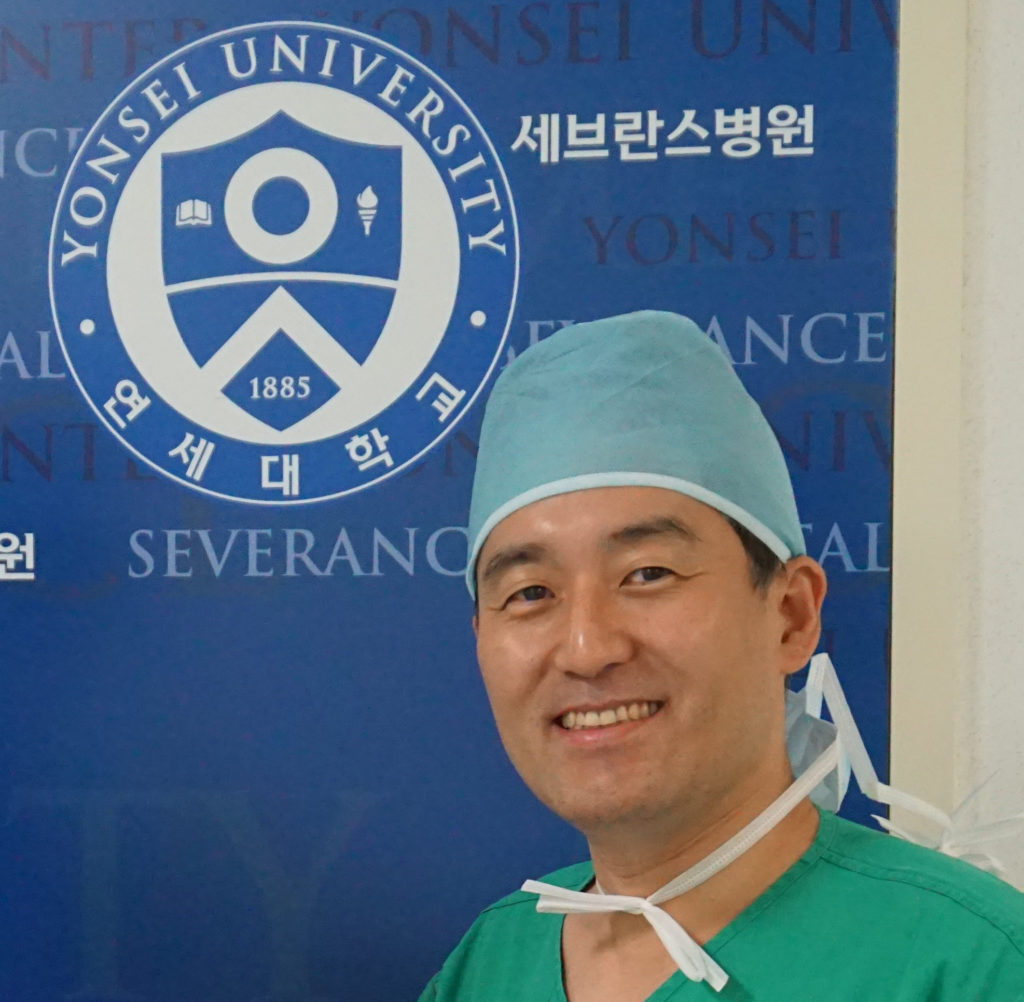Covid-19 and urology
As the BJUI is a Global journal, we felt that we could learn from our global friends amidst a global infectious disease. I asked my colleagues Guohua Zeng from Guangzhou, China, KH Rha in Seoul, Korea and Riccardo Campi from Florence, Italy as to what they had been doing as urologists. Their texts are below but please also listen to these two podcasts from Italy by Andrea Gavazzi and Riccardo Campi.
How are they dealing with outpatient clinics?
Have they stopped elective operating
What about the management of cancers?
What about emergencies such as ureteric stones, trauma and torsion?
Are urologists learning how to treat critically ill patients
I was recently in India as Visiting Professor moving between Mumbai – Vellore – Kolkata. While at Vellore I received the news that a confirmed COVID case had been found near our lab at KCL. My personal assistant took precautionary isolation and I warned my team to await further instructions from Public Health England and the university. I was debating whether to myself travel from Vellore to Kolkata on the final leg of my tour as I did not want to come into contact with my elderly parents in their 80s. Thankfully my handwritten scribbles in my diary confirmed that I had been in my lab area 14 days prior to detection of the case as above. Since I had no symptoms at all, the advice from the hospital in Kolkata that I was visiting was to continue with my travel as planned.
A few days later I left Kolkata for London via New Delhi by Air India. At the Indian capital, I was screened just like all other international passengers and given clearance to travel. I am told that at New Delhi airport this is now routine and crowding at immigration and luggage counters is being minimised to avoid close contact between travellers. While it is impossible to be certain about what happens next, COVID-19 infection in India seems lower than most other countries.
While the response of each nation will be slightly different depending on scientific advice and their local population, here is what our colleagues elsewhere have been doing. Hopefully we can learn and adapt for the weeks and months ahead.
Prokar Dagupta
BJUI Editor-in-Chief
Italy
From: Dr. Riccardo Campi, resident in Urology and PhD student at the Department of Urology and Renal Transplantation, Careggi University Hospital in Florence, Italy.
I am grateful for the opportunity to share with you my perspective on the coronavirus epidemic in Italy and its impact on Urological practice at my Institution.

As of 15th March 2020, the number of laboratory-confirmed cases in Italy was 24 747. Of these, 1809 patients died.
This makes Italy the country with the highest cumulative number of reported COVID-19 cases per 100 000 people in the world according to the European Centre for Disease Prevention and Control.
In Italy the coronavirus epidemic has led to profound repercussions from social, healthcare, economic and political perspectives and unfortunately it appears we are still living its rising phase. Thus, we are striving to manage this complex scenario day by day, learning from real-life experience, joining our forces and doing our best to minimize further infection of the population while ensuring effective care of COVID patients.
To tackle the rapidly spreading coronavirus infection, in the past weeks the Italian Government has released several orders that progressively led to the complete closure of schools, universities, commercial activities, as well as to strict recommendations toward social lockdown.
This is now a really challenging scenario, far more serious than most of us thought just a few weeks ago while watching at a distance the worrying reports from China.
Soon after the explosion of the Covid-19 epidemic in China, the Northern Regions of Italy were hit by the coronavirus with the highest strength, putting a strain on the healthcare human and logistical resources, progressively raising concerns on the availability of qualified professionals, as well as on patient selection criteria for admission to Intensive Care Units (ICU), also from an Ethical perspective. Notably, there have been recent orders by the Italian Government that allow Residents in their final years of training to be hired with temporary contracts in hospitals that lack healthcare professionals to face the emergency.
Importantly, all hospitals across the country had to quickly re-modulate their internal logistics to increase the availability of resources in ICUs. To do so, many hospital services, including Surgical Departments, have been discontinued or reshaped to ensure sufficient numbers of available beds for patients requiring intensive care.
Both doctors and nurses are working tirelessly without breaks to guarantee effective care of COVID patients, especially those requiring long, highly demanding hospitalization periods in ICUs.
There still remains a certain degree of heterogeneity in decision-making regarding both the logistics and the internal politics across Italian hospitals and regions regarding the management of services, wards and ICUs, the remodulation of responsibilities among healthcare professionals, as well as the security practices and the operating room schedules.
Nonetheless, it is important to highlight that there has been a significant proactive spirit of participation, solidarity, and commitment among Italian healthcare professionals from all regions.
In this regard, thanks to the potential of social media and technology, it has been possible for all doctors working on the front-line to share a tremendous amount of information, experiences and recommendations on clinical management of COVID patients as well as correct application of preventive measures in relatively short timeframes.
In this scenario, Careggi University Hospital in Florence, a high-volume referral centre with >1200 beds, >45 operating rooms and >110 000 visits at the Emergency Department per year, has entirely reorganized the Emergency Service logistics to ensure a separate, specific diagnostic pathway for patients with suspected coronavirus infection.
Moreover, the logistics of available ICUs have been remodeled in order to concentrate all suspected or laboratory-confirmed cases in one ICU, leaving the others available for “COVID-free” patients.
The organization and logistics of the Internal Medicine, Infectious Diseases, Surgery and Radiology Services have been also significantly revised to ensure maximal availability of healthcare professionals and resources in the most critical departments in case of need.
At the Department of Urology and Renal Transplantation of Careggi University Hospital, directed by Prof. Sergio Serni and Prof. Marco Carini, several critical modifications of the operating room schedule and of the activities of the outpatient clinic have been ordered in the past two weeks.
Firstly, all elective medical visits and procedures in the outpatient clinical setting have been canceled, including Extracorporeal Shock Wave Lithotripsy, circumcisions, cystoscopies for benign diseases, and follow-up visits for non-urgent reasons. The only exceptions are represented by prostatic biopsies, cystoscopies for suspected bladder cancer and/or hematuria, and first visits for patients requiring urgent urological consultation after a screening phone interview.
Overall, there has been a reduction in the number of operations that are allowed to be performed in the urological operating rooms, with a subsequent reduction in the number of beds of the Inpatient Clinic.
In particular, all elective urology operations for benign conditions (such as TURP, Holep, RIRSs, PCNL, pyeloplasty, surgery for pelvic organ prolapse or urinary incontinence, as well as andrological surgery) have been canceled. In addition, renal transplantation from living donors is currently suspended.
Urological emergencies, including ureteric stones, are currently being performed in our ORs, as needed, provided adequate preventive measures for both patients and staff are in place, and after careful evaluation of the individual case.
Interventions for genitourinary cancers are currently being performed according to their priority. Cancer operations scheduled with the maximal priority (priority “A”) are currently performed according to the waiting list. These operations include TURB, radical cystectomy, partial nephrectomy, radical nephrectomy/nephroureterectomy, ureterectomy, orchiectomy, retroperitoneal lymph node dissection, penectomy, and radical prostatectomy for intermediate-high risk prostate cancer.
Cancer operations scheduled with a lower priority (priority “B”), such as radical prostatectomy for low-risk prostate cancer, are currently being postponed.
Finally, renal transplantation from deceased donors is currently being performed without restrictions, provided that the donor was negative for coronavirus infection.
To date, both residents in urology and consultant urologists at Careggi University Hospital are not being trained to treat critically ill patients with COVID infection.
Overall, the decision to allocate Urologists into ICUs in support of anesthesiologists and intensive care physicians to help cope with the emergency related to the coronavirus infection depends on several factors, including the particular hospital’s scenario, internal politics, needs and available resources.
I do hope that this information might be of value for healthcare professionals and decision makers involved in the management of the COVID epidemic in UK, and that the Italian example might be taken into consideration to prevent further spread of the infection across Europe and worldwide.
Thank you again for the opportunity to share my perspective with all of you,
Best wishes
Riccardo Campi, MD
– Resident in Urology, Dept. of Urology, Careggi University Hospital, Florence (Italy)
– Ph.D. student, Doctoral Program in Clinical Sciences, Dept. of Experimental and Clinical Medicine, University of Florence, Florence (Italy)
– Member of the EAU Young Academic Urologists – Renal Cancer Working Group
– Associate Member of the EAU Section of Oncological Urology
– Twitter: @Ric_Campi

China
From: Professor Guohua Zeng, First Affiliated Hospital of Guangzhou Medical University
How to deal with urological patients during coronavirus epidemic?
1. First of all, we recommend that our new or old patients use online services or telephone medical advice. In my department, most of the consultants are using an online APP for free consultation during the coronavirus period. We therefore reduce the number of visiting patients remarkably.
2. For those who have to come to the hospital in person, they need to make an appointment online first. A questionnaire needs to be completed to clarify their epidemic history within the last 2 weeks. If a patient has positive epidemic history, fever, respiratory symptoms, he/she will be assigned to the designated hospital for isolation and treatment. If not, he/she could see a urologist in the temporary outpatient clinic. In the temporary shelter clinic, wearing masks and single room occupancy are obligatory. Urologists are asked to wear examination gloves, isolation gowns, surgical masks, eye protection and disposable hat and shoe covers in a single room for face to face consultation. Negative complete blood count, chest CT and oropharyngeal swab DNA test are compulsory prior to inward admission or day surgery.

3. One patient-one room policy was obligatory for inpatients. Urological treatment was implemented as routine as long as the patient was proved to be coronavirus free.
4. For coronavirus-infected urinary patients, they were referred to a designated hospital in Guangzhou. A negative pressure stretcher was used for transportation all the way along. Grade 3 protection strategies are required for all relevant staff including surgeons, scrub team, anesthetists, technicians and cleaners during the whole period of treatment.
5. In my institute, the fast track of the coronavirus screening usually needs about 6 hours: 6 hours for the swab DNA test, 2 hours for chest CT scan, 1 hour for CBC. Therefore, for emergent and urgent urological situations, such as kidney rupture needing resuscitation or testes torsion needing exploration, patient will be sent to the designated hospital in the first place. For other non-life-threatening situations such as renal colic or urinary retention, patients were allowed to stay in the temporary shelter clinics waiting for the result of coronavirus screening before they are admitted.
Guohua Zeng
-Dr and Prof in Urology
-Vice-President, the First Affiliated Hospital of Guangzhou Medical University
-Chief, Guangdong Key Lab of Urology
-President, Urological Society of Guangdong Province
-Vice-Chairman, Urolithiasis section of Chinese Urological Association
-Co-chairman and General Secretary, International Alliance of Urolithiasis(IAU)

South Korea
From: Professor KH Rha, Department of Urology at Yonsei University Medical School
To update you on the Corona story in Korea: we had a massive outbreak in Daegu stemming from a religious gathering about a month ago and the medical community put all-out effort to contain this within the region which seems quite successful (different from the Taiwan model where they stopped all international traffic).

There have been no cancellations of elective operations; rather there are layers of entrance evaluations. More importantly everyone wears a protective mask to prevent any inadvertent transmission of the virus. (This aspect is different from US/European protective guidelines which time will tell…)
Urologists are not handling critically ill patients but we take turns in screening centers and other preventive measures.
To increase awareness of the magnitude of the disease, the Korean Society of Laboratory Medicine has prepared a massive screening program since 2017 after MERS-Coronavirus attack in Korea which had 39 casualties. We can do >15 000 tests a day with more than 200+ institutions. Also every patient’s whereabouts is posted on the web and text messages are used to avoid spread. They are unsung heroes.
I think there seems to be a period of 3 weeks of spread.
KH Rha
-Professor, Department of Urology at Yonsei University Medical School
-Director of planning; Chief Operating Officer of Severance Hospital, Seoul, Korea
-Consulting Editor, BJUI
-Associate Editor, Korean Journal of Urology
-Editor-in-Chief, Asian Journal of Urology




